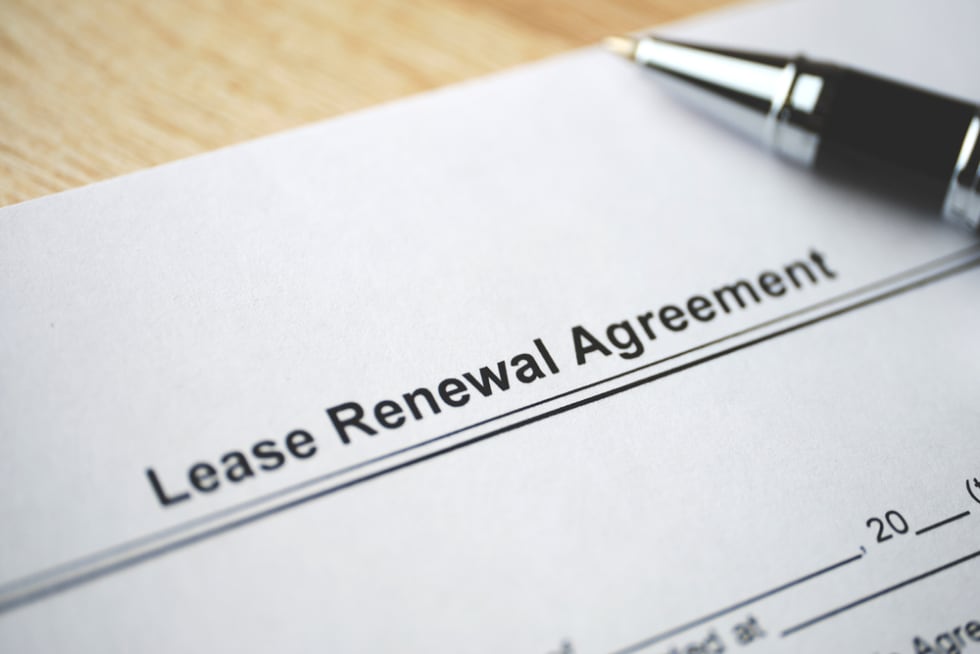- 47 units available
- 1 bed • 2 bed • 3 bed
- Amenities
In unit laundry, Hardwood floors, Dishwasher, 24hr maintenance, Stainless steel, Walk in closets + more

Renters can negotiate a lease renewal for an apartment by employing strategies such as studying the local rental market, positioning themselves as ideal tenants, or using leverage to secure a better offer for renewal.
Whether you received a lease renewal letter from your landlord or are trying to be proactive in securing your apartment for the long haul, you should know that you can and should negotiate your lease renewal.
There is a lot to be gained when it comes to renewing your rental agreement. For instance, you can negotiate rent increases, upgrades to your unit, or even adding pets. Knowing how to negotiate a lease renewal can help you save money on a potential move.
| Tip | |
|---|---|
| Know your lease terms, renewal rights, and do market research | Determine your lease renewal date and deadline. Learn lease renewal rights and notify your landlord about terminating or extending the lease within the correct window.Highlight the landlord's potential costs for tenant turnover to negotiate the renewal price. Research the local rental market to ensure your landlord offers a fair rate. |
| Contact your landlord with a reasonable request and highlight your rental history | Ask for a realistic rental price using pricing data from the local area. When reaching out, put a spotlight on your past rental history, such as paying rent on time every month or making minimal requests. |
| Consider extending your lease, paying upfront, or requesting upgrades. | Move from a flexible month-to-month lease to an annual lease for cost-saving opportunities. Offer upfront payments or a higher security deposit for a good rate on rent. If a landlord won’t offer better rental rates, request upgrades to improve the rental unit. |

Figuring out your lease termination date is a good start. Proceed by meticulously studying all clauses related to your renewal rights and terms. Many rental agreements require you to notify your landlord about your decision to terminate or renew your lease at least 30 or 60 days before the end of the lease term.
You may not be aware of it, but most landlords prefer that you renew your lease to minimize tenant turnover. Use tenant turnover as leverage to reduce your landlord's potential costs.
Costs associated with turning around a rental unit, cleaning it, making necessary repairs, and finding new tenants might outweigh the potential benefits of raising your rent. Keep in mind that your leverage is stronger when dealing with individual landlords as opposed to large property management companies.
Yes, if your landlord decides to raise your rent, be ready to provide strong counterarguments by knowing what your apartment is worth. Check market rental rates for similar apartments in your area, ask other tenants and your neighbors what they pay. If your landlord hasn’t upgraded the unit in years and is trying to increase your rent above its market level, you have the right to negotiate.
It might also be a good idea to learn about vacancy rates in your city and neighborhood. If there is no demand for housing in the area due to high crime rates, poor infrastructure, or an oversupply of properties available on the market, they might have to spend big bucks to fill the unit.
Finally, don't forget to read about landlord and tenant laws in your city and state. Depending on where you live, there might be different rules regulating annual rent increases.
Make reasonable requests and attempts at negotiation by not asking for “too much” of a reduction in their suggested price. Do your research to ensure that your request is reasonable.
For example, if your landlord raises the rent, but the new price is still low for your area, then their rent request might be reasonable. In that case, you may not have as much leverage to counteroffer. Instead, consider requesting an alternative benefit, such as a free or reduced pet fee or parking charge.
Communication is key to a successful lease negotiation. Be proactive and let your landlord know that you are looking into renewing your lease and are ready to discuss its terms.
Use resources such as “How to Win Friends and Influence People” to communicate, build a relationship, and eventually negotiate with your landlord. Ideally, you should start building rapport with your landlord at the beginning of your tenancy, rather than waiting until it’s time to negotiate.
From the day you sign the lease, you should position yourself as a star tenant.
Are you “low-maintenance”? Have you been paying rent on time? Is your unit in a better condition than before you moved in? Be sure to mention these points when negotiating your lease. Responsible and reliable tenants are not that easy to come by.

If your tenancy is month-to-month, suggest signing an annual contract. If you are sure you are going to spend at least a couple of years in the area, suggest a multi-year lease. Landlords should ideally offer a lower rent price if you’re willing to sign a multi-year lease.
Some individual landlords might be willing to consider a lower rent increase if you are prepared to pay a couple of months' rent upfront or increase your security deposit.
If you have access to a lot of cash, you could even offer to pay 6 to 12 months' rent at one time to get a better rent offer.
If your landlord or property manager is adamant about raising your rent, try asking for improvements to the property. If the appliances in the unit are old, request upgrades. If you’ve always wanted to get a cat or a parrot, it’s a good time to bring one up!
Be respectful and present your point calmly. If you can’t save on rent, you should at least get something out of it!

If you decide renewing isn't for you, then let us help you find your next place. Our tools use your ideal location and amenities in order to show you flexible options within your budget. Get started with our easy quiz.
Yes, negotiating a shorter lease is possible. Landlords prioritize stable, long-term tenants, but they might be flexible depending on your situation. Be transparent about your needs and why you need a shorter term. Highlighting your reliability as a tenant (on-time rent payments, good upkeep) can strengthen your case. Be prepared to offer concessions, like a slightly higher rent, to offset the inconvenience of a shorter lease term.
There's usually no direct cost to extend a lease besides the ongoing rent payments. However, during renewal negotiations, your rent might increase. Landlords may adjust rent based on market rates or property improvements. Review your lease to see if there's an automatic rent increase clause. Negotiate to minimize the increase, referencing on-time payments or offering to sign a longer lease extension in exchange for a smaller rent increase.
A well-written letter can be a great negotiation tool. Research average rental prices for similar units in your area. Document any issues with the property that haven't been addressed. Frame your request positively, highlighting your on-time payments and responsible tenancy. Express your desire to stay, but explain why the current renewal rent might not be feasible. Be open to compromise, suggesting a smaller rent increase or offering a longer lease term in exchange for a lower monthly rent.
Yes, it’s normal to negotiate when signing another lease. While many landlords hope that tenants will sign the new lease without negotiation, it’s very beneficial to try and negotiate. You may receive benefits such as more affordable rent, or they may make improvements to the rental unit.
If your landlord has sent a lease renewal offer and you plan to move or reject it, send a formal written notice of non-renewal within the notice period specified in your lease agreement. If your landlord participates in tactics such as sending out lease renewals a year in advance and states they’ll raise the rent by hundreds of dollars if you don’t sign, then start negotiating early.
Yes, you can negotiate a lease extension. Speak with your landlord informally or send a formal letter to discuss extending your lease.



In unit laundry, Hardwood floors, Dishwasher, 24hr maintenance, Stainless steel, Walk in closets + more
In unit laundry, Granite counters, Pet friendly, Stainless steel, Walk in closets, Gym + more